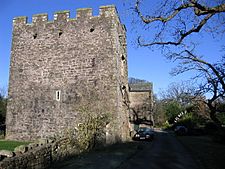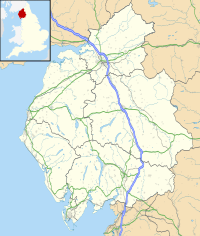Branthwaite Hall facts for kids
Quick facts for kids Branthwaite Hall |
|
|---|---|
| Cumbria, England | |

Pele tower
|
|
| Coordinates | 54°36′51″N 3°26′57″W / 54.6142°N 3.4493°W |
| Type | Pele tower |
| Site information | |
| Condition | Intact |
| Site history | |
| Materials | Rubble masonry |
Branthwaite Hall is a special old building in Cumbria, England. It's a type of strong house called a pele tower. A historian named Anthony Emery thinks it's "one of the best-preserved early houses in Cumbria." This means it's a great example of how people lived and built homes a very long time ago.
Contents
The History of Branthwaite Hall
When Was Branthwaite Hall Built?
Branthwaite Hall was built a long time ago, in the middle of the 1400s. It's located near the village of Branthwaite and the town of Cockermouth. The Skelton family built it. They got the land around the hall by marrying into the Branthwaite family.
How Was Branthwaite Hall Constructed?
The building was made from rough stones, called rubble stone. It had a single strong tower with a wall around the top, called a parapet. There was also a spiral staircase inside the tower. Next to the tower was a large main room, or hall.
The main hall was quite big, about 60 feet (18 meters) long and 42 feet (13 meters) wide. In 1604, the hall was changed a lot. It used to have smaller rooms inside, but after the changes, it became one big open space. More windows were also added to let in more light. Later, in the 1670s, more work was done to make the hall look even grander and more impressive. The Skelton family owned Branthwaite Hall until 1757.
Branthwaite Hall Today
What Is Branthwaite Hall Used For Now?
Branthwaite Hall was fixed up between 1985 and 1986. The National Coal Board helped with the restoration. They turned the old hall into offices. Even though it's used for offices now, it still keeps its historic look. As historian Anthony Emery said, it's still "one of the best-preserved early houses in Cumbria." This means it's a great place to see what old English houses looked like.
 | George Robert Carruthers |
 | Patricia Bath |
 | Jan Ernst Matzeliger |
 | Alexander Miles |


